|
|
|
Sort Order |
|
|
|
Items / Page
|
|
|
|
|
|
|
| Srl | Item |
| 1 |
ID:
110770


|
|
|
|
|
| Publication |
2011.
|
| Summary/Abstract |
This article assesses the extent to which security regimes are the products of authorization in the thought of Thomas Hobbes and Carl Schmitt. The Hobbesian security regime offers a contingent construction of security in terms of processes of authorization and brings into view questions about the epistemic construction of security within security discourse today. The Schmittian concept of security involves the naturalization of security through the state, meaning that security is understood as condition rather than regime. Rather than look to Carl Schmitt's concept of security as the paradigm of international security today, there are clear benefits in returning to the contractual account of security evident in the Hobbesian emphasis on authorization. Security is not the primary value of political community, but the means by which political communities realize their internal goods. Schmitt's security regime is fictive, driven by colourful metaphor and political theology. By returning to classic questions of authorization-how a security regime authorizes itself-International Relations theory can examine the legitimation of security beyond an exclusively state-centric model.
|
|
|
|
|
|
|
|
|
|
|
|
|
|
|
|
| 2 |
ID:
110767
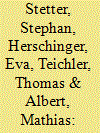

|
|
|
|
|
| Publication |
2011.
|
| Summary/Abstract |
In the current literature in International Relations and Conflict Studies, water as a source of conflict is either extremely over- or exceedingly underrated. In order to account for the dynamics of water conflicts, it is argued in this article that the study of water conflicts should be linked to comprehensive theories of social conflict and world society. A theoretical framework is developed based on a combination of securitization theory, modern systems theory and sociological neo-institutionalism. The usefulness of this framework is illustrated through two empirical cases of water conflicts, namely Spain and Egypt/Sudan. This study contributes to an understanding of the evolution of water conflicts as a result of securitization practices, the dynamics of these conflicts as complex social systems and as the outcome of local adaptations to and of 'world cultural' frames.
|
|
|
|
|
|
|
|
|
|
|
|
|
|
|
|
| 3 |
ID:
110766
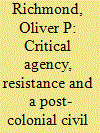

|
|
|
|
|
| Publication |
2011.
|
| Summary/Abstract |
IR's dominant theoretical and methodological approaches are, to varying degrees, compliance oriented. IR needs a theory of resistance if it is to survive its current methodological and ethical crisis. Resistance, read from a broadly Foucaultian perspective, is a process in which hidden, small-scale and marginal agencies have an impact on power, on norms, civil society, the state and the 'international'. This may be in the form of individual or grass-roots critical agency not coordinated or mobilized on a large scale but still globally connected. Such agency is often discursive and aimed at peaceful change and transformation. Through such critical agency a post-colonial civil society has emerged, which is transversal, transnational, fragmented, but may be constitutive of new, hybrid and post-liberal forms of peace.
|
|
|
|
|
|
|
|
|
|
|
|
|
|
|
|
| 4 |
ID:
110773
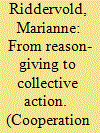

|
|
|
|
|
| Publication |
2011.
|
| Summary/Abstract |
The aim of this article is to contribute to the further development of deliberative theory-to make it more applicable to research on EU integration-by establishing alternative and more concise micro-mechanisms to those of the rationalist bargaining perspectives. It is suggested that the micro-mechanism through which deliberation has an effect on outcomes is what is termed argument-based learning, which means that an actor accepts the validity of a presented argument so that (s)he acts upon it. Moreover, the article differentiates between three types of argument-based learning considered relevant in the EU context. On this basis, it suggests a two-step analytical approach for studies of EU decision-making processes. In trying out the empirical relevance of the framework, it is applied to a case where one would not expect agreements on common EU policies to have been reached due to argument-based learning, namely EU coordination towards the Maritime Labour Convention (MLC). The framework proved helpful in accounting for agreements that are puzzling from a rationalist perspective.
|
|
|
|
|
|
|
|
|
|
|
|
|
|
|
|
| 5 |
ID:
110771


|
|
|
|
|
| Publication |
2011.
|
| Summary/Abstract |
One of the key themes in recent discussions about the EU's foreign and security policy has been the question of Europeanization. This article seeks to contribute to this field of research by investigating the way in which a single EU military crisis management operation, the EUFOR Chad/CAR, has been perceived and debated on a national parliamentary arena in two member states, Sweden and Finland. The results suggest that a marked discontinuity prevailed between these nations' policies in the context of the CSDP/ESDP and the discourse on CSDP/ESDP in the respective parliaments. While highlighting the need to pay more attention to the domestic dimension of Europeanization, these findings also call into question some of the basic premises of the discussion on Europeanization.
|
|
|
|
|
|
|
|
|
|
|
|
|
|
|
|
| 6 |
ID:
110768
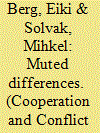

|
|
|
|
|
| Publication |
2011.
|
| Summary/Abstract |
The UNDP report The Silent Majority Speaks (2007) demonstrates widespread consent and a popular desire for change while promoting a single state with strong regions as a compromise model for Bosnia and Herzegovina (BiH). Surprisingly, our own research (2009) on political legitimacy reveals quite the opposite tendencies, where political entities such as the Federation of Bosnia and Herzegovina (FBiH) and the Republika Srpska (RS) more often drift apart than merge together. What strikes us is the fact that the FBiH, which advocates a more integrated state, does not necessarily have more legitimate grounds for achieving that goal than the secessionist counterclaim of RS in its own right. The two entities remain worlds apart on a range of issues and agree only on rather abstract principles of an ideal political order.
|
|
|
|
|
|
|
|
|
|
|
|
|
|
|
|
| 7 |
ID:
110769
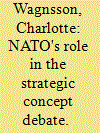

|
|
|
|
|
| Publication |
2011.
|
| Summary/Abstract |
This article argues that traditional Westphalian powers are increasingly pressured to move beyond Westphalia towards institutionalization of security cooperation and a broader definition of referent objects of security. Focusing on the case of the North Atlantic Treaty Organization (NATO), it notes that the Alliance is severely torn between traditional constructions of 'the self' and a need for change. Exploring how NATO handles this dilemma, the article examines how the Alliance articulated its constitutive story during the strategic concept process of 2009-10. Four roles are crystallized from the reading of the narrative: the fire-fighter, the watchdog, the good neighbour and the seminar leader. It is argued that NATO will be able to meet the exigencies of the post-Westphalian world more or less effectively depending on how it develops in each of these roles. The article concludes that NATO largely remains Westphalian in its four roles, but the launching of the seminar leader role indicates that it may be preparing a farewell to Westphalia. NATO is a composite actor and tensions between academic, global reformist and traditionalist regional story-lines will prevail. Nevertheless, the globalized threat environment is likely eventually to force NATO to fully recognize the need for a more post-Westphalian approach to security.
|
|
|
|
|
|
|
|
|
|
|
|
|
|
|
|
| 8 |
ID:
110772
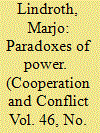

|
|
|
|
|
| Publication |
2011.
|
| Summary/Abstract |
In the United Nations (UN) Permanent Forum on Indigenous Issues (PF), indigenous political subjectivities take shape in the power relations that not only make indigenous peoples subjects but also subjugate them. This article discusses the process and the possibilities of resistance that open up for indigenous peoples within it. The approach taken acknowledges the limiting political environment of the UN for indigenous peoples, because it is a non-indigenous political system based on state sovereignty. Yet, it does not view the situation of those peoples in the PF as totally determined by the states and their dominant discourse. The theoretical framework of the article draws on the work of Michel Foucault and his conceptions on power, resistance, subjectification, technologies of domination and of the self. The power struggles in the PF, described through the complex of sovereignty, discipline and government, and the resistances within them engender paradoxical indigenous subjectivities: colonized/decolonized, victim/actor, traditional/modern, global/local. Indigenous peoples are able to engage both in resistance that is a reaction to states' exercise of power or the creative use of its tools and in indirect resistance that 'stretches' the UN system and constitutes action on its own terms.
|
|
|
|
|
|
|
|
|
|
|
|
|
|
|
|
|
|
|
|
|